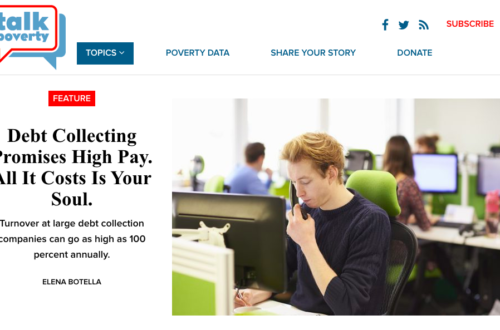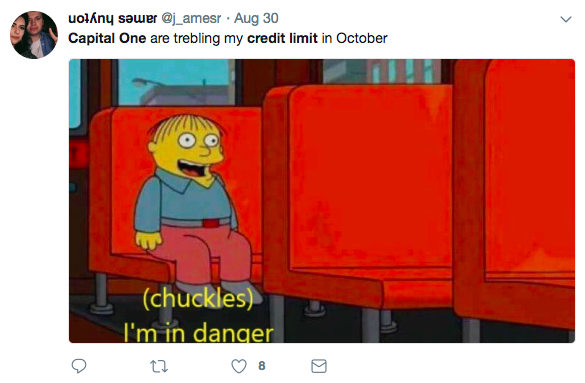I just finished my road trip. The goal was to learn about the impact that credit cards and payday loans have in Americans’ lives. I’m now back in Washington, D.C. If you haven’t already read the previous blog posts, here were some of my reflections from Michigan and Missouri.
Now that I’ve interviewed folks in 18 states for this project (well 17 states, plus the District of Columbia which obviously should be a state!), here are themes on my mind.
“Impatience” isn’t the problem
In Sacramento, I talked to Kathryn, a 63-year-old woman with $60,000 in credit card debt, which she’s whittled down from a peak of $80,000.
Kathryn worked as a nurse for 13 years before becoming a stay-at-home mom in a small town east of St. Paul, Minnesota, near the border with Wisconsin, nearly half an hour from the closest grocery store. Kathryn got divorced right as her youngest kid was starting college. She suddenly found herself alone in a home, surrounded by other people’s stuff: her ex-husband took half the things they’d bought together, and the realtor staged the house with model furniture. Even though the divorce agreement said the full amount of alimony wouldn’t take effect until the house sold, she went ahead and moved into an apartment anyway—it was too depressing to stay in the empty home—without realizing how long it would take to sell the house. The Great Recession was deepening. She racked up credit card debt between attorney’s fees, her car payment, and paying rent while she waited for the full amount of alimony to kick in.
At the same time, she still wanted to help put her three kids through college, and continued to send them cash despite being deeply under water. In writing about credit card debt, economists Scott Schuh and Scott Fulford have said that “more than half the population must be very impatient and care little about risk to hold the amount of revolving debt we observe.” Of course, that framework doesn’t really square with putting your children’s well-being ahead of your own, an act that is deeply future-oriented. More broadly, the schema of “I could have one marshmallow today or two marshmallows tomorrow” is only rarely appropriate for the actual types of trade-offs families are making when it comes to debt.
One additional reflection on marshmallows from this trip:
Vegan marshmallows will definitely melt in your car
Wrap those bad boys up!
It’s time for credit cards to have their comeuppance
According to data from the 2018 Federal Reserve Survey of Household Economics and Decision Making, 91 million Americans have unpaid credit card debt. While 96 million adults said they paid their credit card bill in full every month, a larger number, 106 million, said they carried an unpaid balance at least once over the last 12 months. More than half of those — 54 million — said they had unpaid credit card debt most or all of the time.
Despite the fact that credit card debt is still a central challenge in people’s lives, student loans have sucked all the air out of the room when it comes to talking about debt. It’s easy for people with student loan debt to contextualize the problem as basically a societal one: the byproduct of higher tuition and broken promises. And, of course, the fact that people signed on the dotted line when they were just 18 years old makes it relative easy for them to feel angry instead of embarrassed. By contrast, people deeply internalize the shame of being in credit card debt. I talked to a woman in Seattle who had just moved from Michigan looking for work. “Credit score hinders everything [….] it was tight to get things established,” she said. At the same time, she added, “It’s the individual that gets themself in debt.” At least two Democratic front-runners have proposed cancelling most student loan debt, while proposing to wipe out credit card debt would be more or less unfathomable in our current political climate. Student loan debtors are depicted as sympathetic and credit card debtors are depicted as irresponsible.
Geography matters
On this trip, I talked to people moving from basically every part of the country to basically every part of the country without having a job lined up in advance — in some cases people who literally were moving to and from opposite places.
There’s a lot of places where it’s taken as given you won’t get ahead unless you jump ship. Explaining why his daughter had racked up so much credit card debt, Curtis, a veteran and artist in Council Bluffs, Iowa, said, “She had the best opportunities […] She majored in arts education and she wanted to teach art. She didn’t want to relocate, and if you don’t want to relocate you’re a done deal.”
But there are definitely no set rules for how you’re supposed to go about relocating to make ends meet, when big cities have high costs of living, and smaller towns have few jobs. The lists of “best places to live in America” would be pretty useless to anyone actually figuring out where to go: the variables that actually matter are probably things like the unemployment rate, the median income for people without a college degree, the 40th percentile of prices for a studio apartment, and whether or not the state expanded Medicaid.
I’m still especially interested in the “Ability to Pay” doctrine. In 2010, Congress passed legislation saying credit card company couldn’t issue consumers a credit line unless they could demonstrate the customer could pay the loan back at their current income. More recently, the Consumer Financial Protection Bureau has been going back and forth on implementing rules that would do the same thing for payday loans: effectively outlawing lending money to people who are unemployed. The logic is clear: it can cause outsize harm to lend someone money if you have no idea whether they can repay you, especially because it normally means that you’re charging such high fees that you can break even, even if the customer defaults. And yet, what does it mean for literal mobility in this country if it’s illegal to lend someone enough money to buy a Greyhound ticket and stay at a hostel until they line something up?
What’s next
I’ll be continuing research for this project, and I’m still hoping to talk to more people with experiences with credit card debt, personal loan debt and payday loan debt. If that’s you or someone you know, please drop me a line. I’m moving more into the manuscript phase of this project. It’s been exciting over the last few days to be making progress every day in telling Americans’ stories. I’ll be writing some standalone pieces this fall, as well, and potentially doing some consulting work, at a much lower number of hours than this past spring.
Here are some of the topics I’ve been thinking about outside of my major debt project:
- Wage theft: I’m increasingly fascinated both by all the scams employers use to avoid paying people, and why some states/cities refuse to create a climate that would hold employers accountable– when even the most ‘free-marketeers’ among us agree that people should get paid the amount they’re owed for work.
- The consequences of natural disasters for households: I’ve been talking to people in the Houston area about how Hurricane Harvey impacted their personal finances. I’m especially interested in the phenomenon of people using their disaster relief to pay off student loans while foreclosing on their homes. I’m also interested in efforts across the country to ensure fair labor standards when we rebuild after natural disasters.
- The Community Reinvestment Act: What affirmative obligations should be placed on banks? When this legislation was written, the phenomenon of “they’ll take my deposits but won’t lend to me” was a common critique, especially for minority families: now, it seems like predatory lending is rampant and people can no longer count on getting a free checking account.
- Housing crises in rural areas: I talked to people in Red Oak, Iowa, about how areas of concentrated poverty sprung up after FEMA redrew their flood maps. I’m interested in the forces that create housing affordability challenges outside of places like New York and San Francisco.





